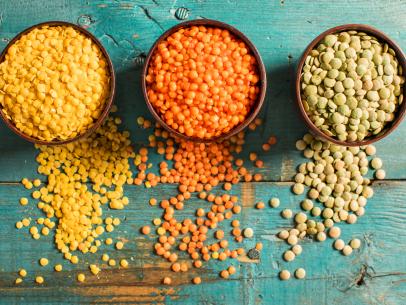Chinese Study Finds That Lectins Derived From Indian Lentils Or Dhal Exhibit Antiviral Properties Against The SARS-CoV-2 Coronavirus.
Source: COVID-19 Antivirals Jul 29, 2021 3 years, 8 months, 4 weeks, 14 hours, 45 minutes ago
A new study by scientists from the National Institutes for Food and Drug Control (NIFDC)-China has found that lectins derived from lentils (Lens culinaris)- a staple in Indian cuisine often known as dhal, exhibits antiviral properties against the SARS-CoV-2 coronavirus.

The study findings were published in the peer reviewed journal: Emerging Microbes and Infection.
https://www.tandfonline.com/doi/full/10.1080/22221751.2021.1957720
To date the Sars-CoV-2 coronavirus has infected more than 196 million people globally and caused more than 4.2 million deaths. Despite the advent of a variety of COVID-19 vaccines, constant newly emerging variants are threatening to undo all efforts to contain the pandemic and many more people are expected to die in coming surges, creating an urgent need for the identification of new antiviral therapeutics against the novel coronavirus.
To date it has been found that the spike (S) protein of the SARS-CoV-2 coronavirus is constantly mutating continuously and the newly emerging variants are escaping from antibody-mediated neutralization.
The spike protein is heavily glycosylated and the glycosylation sites are relatively conserved, thus glycans on S protein surface could be a target for development of anti-SARS-CoV-2 strategies against variants.
Please help sustain this website, all our research initiatives and also community work by making a donation. Your donation helps saves lives. https://www.thailandmedical.news/p/sponsorship
In the study the research team collected twelve plant-derived lectins with different carbohydrate specificity and evaluated their anti-SARS-CoV-2 activity against mutant strains and epidemic variants using a pseudovirus based neutralization assay.
Interestingly the study found that the Lens culinaris derived lentil lectin which specifically bind to oligomannose-type glycans and GlcNAc at the non-reducing end terminus showed most potent and broad antiviral activity against a panel of mutant strains and variants, including the artificial mutants at N-/O-linked glycosylation site, natural existed amino acid mutants, as well as the epidemic variants B.1.1.7, B.1.351 and P.1.
Importantly
lentil lectin also showed antiviral activity against SARS-CoV and MERS-CoV.
The study team found that lentil lectin could block the binding of ACE2 to S trimer and inhibit SARS-CoV-2 at the early steps of infection. Using structural information and determined N-glycan profile of S trimer, taking together with the carbohydrate specificity of lentil lectin, we provide a basis for the observed broad spectrum anti-SARS-CoV-2 activity.
Lentil lectin showed weak hemagglutination activity at 1 mg/mL and no cytotoxicity activity, and no weight loss was found in single injection mouse experiment.
The study findings provide the first evidence that lentil lectin strongly inhibit infection of SARS-COV-2 variants, which should provide valuable insights for dev
eloping future anti-SARS-CoV-2 strategies.
Please help sustain this website, all our research initiatives and also community work by making a donation. Your donation helps saves lives. https://www.thailandmedical.news/p/sponsorship
For the latest on
COVID-19 Antivirals, keep on logging to Thailand Medical News.
Read Also:
https://www.thailandmedical.news/news/breaking-french-study-shows-that-mannose-specific-lectins-from-plants,-fungi,-algae-and-cyanobacteria-can-prevent-various-coronavirus-transmissions-in
https://www.thailandmedical.news/news/study-shows-that-various-bioactive-compounds-from-microlalgae-including-lectins,-polysaccharides,-flavonoids,-polyphenols,-peptides-and-pigments-could
